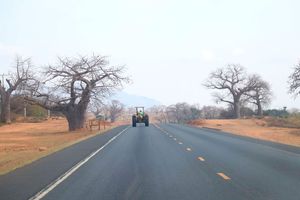
There are about 15 of these ‘small-big’ things to wish for in 2024.
You are a small man or woman on the outskirts of Nairobi. You realise nobody will listen to you if you ask for big reforms and policies to make 2024 a better year than 2023.
Some things are too contentious and difficult. For example, asking for a 50 per cent cut in public spending (or, indeed, increasing taxes by high margins); cutting corruption by 75 per cent and arresting and sacking all crooked officials; making Kenya Airways profitable again within a year; and fixing all rutted roads in the country.
You, therefore, ask for small things that can be impactful, over which there isn’t too much disagreement, which don’t get caught up in partisan politics and don’t require hundreds of billions of shillings.
A simple example will illustrate. Until recently, every year, more than 100 desperate Kenyans were burnt to death and hundreds severely injured while they scrambled to scoop the spilt fuel when overturned petrol tankers caught fire.
For days on end, we would be glued to the TV screens, following the extended live coverage, and newspapers would clear the first quarter of the book to do specials and splash photographs. We haven’t had that gory feast for some time because such tragedies are few and far in between.
Nobody spoke about how that came to be; how much it cost to end the disasters; or come out to claim credit. It took several small bits. Some tankers got better seals; the main highways which the trucks ply are in relatively great shape; and there is more public safety awareness. Often, the most significant changes happen that way.
There are about 15 of these ‘small-big’ things to wish for in 2024 but we have space for only five here.
First, double down on fighting malaria, for which we finally have a vaccine. It has been estimated that the economic costs of malaria represent about one per cent of total household income in Kenya. And almost 170 million working days are lost yearly to malaria. Sort out malaria and you add that value back to the economy.
Second, get down and dirty with road safety. Some 10 years ago, it was estimated that, besides loss of lives, the cost of road crashes to the economy was Sh14 billion per year. By the end of 2017, the National Transport and Safety Authority (NTSA) was citing the figure as at least Sh300 billion—with the most affected age groups in terms of deaths being 20-44—the future!
It can be done. Kenya is already doing better than South Africa. Between January 1 and December 7, 2023, there had been 3,999 deaths due to road crashes—down from 4,352 over the same period last year. South Africa was already past 12,000, with 719 over the festive season alone.
Improve air quality
That contrasts with Rwanda, which had two deaths of boda boda riders over the Christmas weekend. Countries like Norway, which go months with no road crash deaths, have set themselves a target of zero deaths for the whole year in the coming years.
Third, we can do a few things to improve air quality, beginning with banning the burning of garbage dumps in urban areas. Data from 2019, for example, says about 2,500 premature deaths were attributable to air pollution in Nairobi alone. Air pollution exacerbates lower respiratory infections, the fourth-most important cause of death and disability combined in Kenya. In addition, the pollution of Nairobi River needs to be tackled with the commitment we saw briefly about 10 years ago.
Most of the 2,500 tonnes of waste produced in Nairobi every day goes directly into the river. Thousands of people in the poor areas of the city where the river flows, and further downstream, who use its water, are getting all sorts of illnesses.
A report in a foreign publication earlier in the year had some shocking things to say. Downstream of the growing pollution problem, the Athi River area is the source of many vegetables sold in Nairobi markets. It quoted Morris Mutunga, who grows kale (sukuma wiki), spinach and amaranth on his five-acre farm, saying he watched crops like French beans wither when irrigated with contaminated water.
Fourth, an old, extremely boring, but very important issue—dealing with post-harvest loss. According to the UN’s World Food Programme (WFP), an estimated 40 per cent of harvested crops in Kenya are lost annually, leading to financial losses of up to $500 million (Sh78 billion). With drought, the ravages of climate change and the resulting food insecurity, sharply reducing post-harvest losses would solve a large part of the livelihood crisis.
Fifth, deal with building collapses. According to Kenya Institute for Public Policy Research and Analysis (Kippra), between 2009 and 2019, some 86 buildings valued at over Sh2.4 billion collapsed in the country, killing 200 people. Needless deaths and waste. These fixes are easy to achieve, and not hot political potatoes, so palatable to all the warring political sides.
- Mr Onyango-Obbo is a journalist, writer, and curator of the “Wall of Great Africans”. @cobbo3







